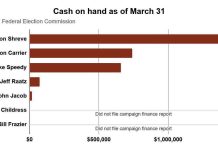A state hate crimes law, a personal change of heart and family resources with information about diversity will help in the fight against racism and hate.
A panel of five people, plus a crowd of about 60 people, came up with those possible solutions at a Monday evening meeting titled “Defeating Hate in a Welcoming Community.”
The Columbus Bartholomew Area Chapter of the NAACP, the local African American Pastors Alliance and Ivy Tech Student Life sponsored the Rev. Martin Luther King Day gathering in the Columbus Learning Center lecture hall.
The event added something of an exclamation point to a local celebration of the federal holiday honoring King that included a community breakfast, an IUPUC luncheon and the free movie “Selma” at the Bartholomew County Public Library on Monday.
[sc:text-divider text-divider-title=”Story continues below gallery” ]Click here to purchase photos from this gallery
The crowd consisted of ministers, former political candidates, members of Bartholomew County Indivisible and a diverse crowd of local residents in the audience.
The panel discussion came about in part from the news that surfaced in November of police arresting nine people identified as members or known associates of the hate group known as the Aryan Brotherhood. While the Southern Poverty Law Center identifies the Aryan Brotherhood as the nation’s oldest major white supremacist prison gang and national crime syndicate, Columbus police emphasized the arrests had nothing to do with any race-related crime.
However, at least two other hate groups have made their presence known in Columbus the past two years.
The meeting also is important in a city where several large firms regularly hire a diverse work force recruited from global locales. And many of those workers from various geographic and spiritual backgrounds, ranging from blacks to Muslims, have been vocal about their need to feel safe and accepted living in a smaller southern Indiana city.
Matters of the heart
Columbus Mayor Jim Lienhoop, one of a five member panel, began the discussion by acknowledging that “part of my job description is making sure a diverse Columbus is a welcoming community,” he said.
Other members of the panel were the Rev. Felipe Martinez, Jerome Wood, Tosha Lafferty, and Kassidy Humes.
Bob Pitman, who ran for a state representative post in 2016, was the first to ask about the current status of hate crimes legislation. Indiana is among five states nationwide without such a measure.
The Rev. Mark Teike mentioned he certainly is not against a hate crimes bill. But he reminded everyone that laws can go only so far.
“Legislation doesn’t change the heart,” the pastor said.
Later, others mentioned that even pushing for people’s inner change does not negate the need for legislation for specific punishment for hate crimes.
Bishop Charles A. Sims encouraged people to look to the late Rev. Martin Luther King in handling racial and other division.
“He regularly used the weapon of love to fight hate,” Sims said.
A big part of the 90-minute discussion was about the use of novels such as Harper Lee’s classic tale “To Kill a Mockingbird” in local schools through the years. The work became a flashpoint for controversy for four months spread over late 2003 and early 2004 in the city. Local blacks and the NAACP voiced such anger about Columbus East High School’s planned production of a stage version of the story that East canceled the show.
And local actors then staged a public reading of the play at the Crump Theatre — with a few black residents in attendance.
Bad outweighs the good
A number of black residents in the audience said that the pain of their child hearing racial slurs in class canceled out any literary power “To Kill a Mockingbird” could possibly carry — especially when their still-emotionally-maturing son or daughter already struggled with being called a racial slur — or even being labeled a “slave,” by peers during historical discussions of slavery.
Those residents said that, whatever the author’s original intent, the work fueled hatred rather than understanding. Not all agreed. Panelist Humes, a current East student, said she has a newfound appreciation for the book, even while sensitive the concerns raised at the panel discussion.
Audience member, Ann Jones, said that for the first time, she experienced a change of heart on such a matter while listening to parents pour out their heart on the topic of the treatment of their children by peers at school. She said she could identify with minorities’ plight.
“The she-wolf in me started to bristle,” Jones said, adding that she would fiercely protect her own from racial intimidation in a class or elsewhere.
The Rev. John Armstrong said that educating parents about hate is a key issue to fighting it anywhere.
“I firmly believe that when children hate, it’s because they are taught hate in their own home,” Armstrong said.
[sc:pullout-title pullout-title=”A bias test” ][sc:pullout-text-begin]
Audience member Linda Iwamuro, who said she considers herself as a person of color because she is of Asian descent, suggested that people might gauge their view of others’ differences by taking an online bias test.
"It should help you understand where you really are (with race and more)," she said.
She mentioned one from Harvard University as one example:
implicit.harvard.edu/implicit/
[sc:pullout-text-end]




